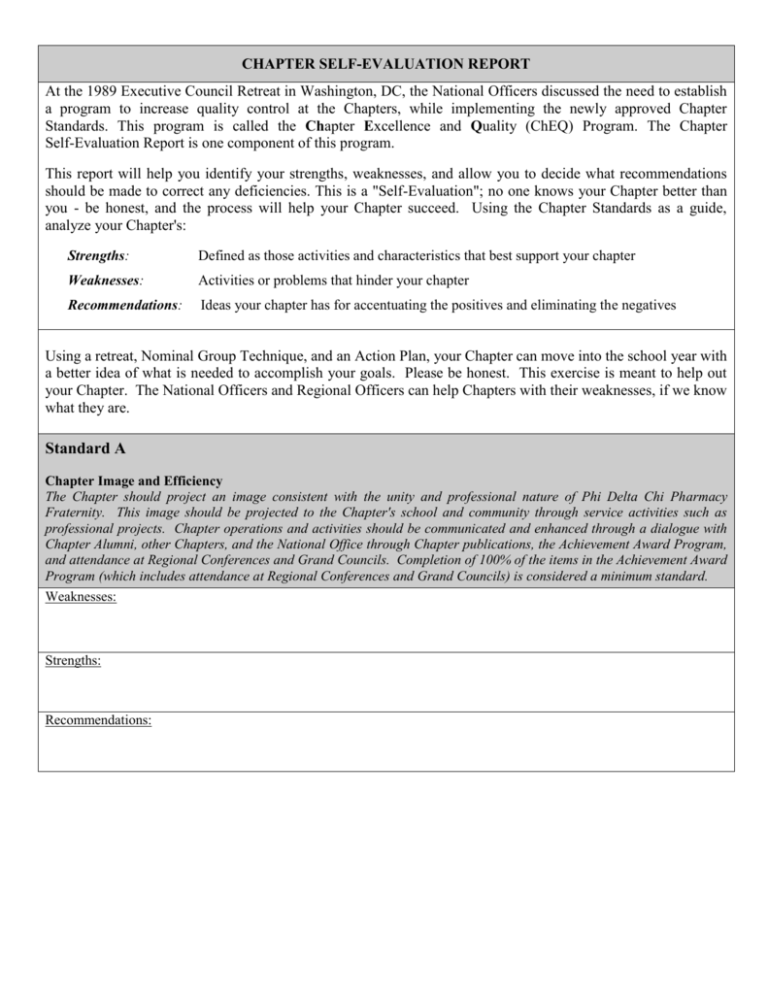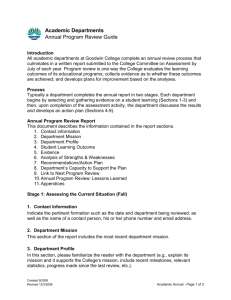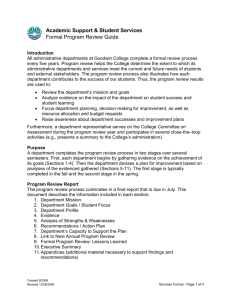CHAPTER SELF EVALUATION REPORT
advertisement

CHAPTER SELF-EVALUATION REPORT At the 1989 Executive Council Retreat in Washington, DC, the National Officers discussed the need to establish a program to increase quality control at the Chapters, while implementing the newly approved Chapter Standards. This program is called the Chapter Excellence and Quality (ChEQ) Program. The Chapter Self-Evaluation Report is one component of this program. This report will help you identify your strengths, weaknesses, and allow you to decide what recommendations should be made to correct any deficiencies. This is a "Self-Evaluation"; no one knows your Chapter better than you - be honest, and the process will help your Chapter succeed. Using the Chapter Standards as a guide, analyze your Chapter's: Strengths: Defined as those activities and characteristics that best support your chapter Weaknesses: Activities or problems that hinder your chapter Recommendations: Ideas your chapter has for accentuating the positives and eliminating the negatives Using a retreat, Nominal Group Technique, and an Action Plan, your Chapter can move into the school year with a better idea of what is needed to accomplish your goals. Please be honest. This exercise is meant to help out your Chapter. The National Officers and Regional Officers can help Chapters with their weaknesses, if we know what they are. Standard A Chapter Image and Efficiency The Chapter should project an image consistent with the unity and professional nature of Phi Delta Chi Pharmacy Fraternity. This image should be projected to the Chapter's school and community through service activities such as professional projects. Chapter operations and activities should be communicated and enhanced through a dialogue with Chapter Alumni, other Chapters, and the National Office through Chapter publications, the Achievement Award Program, and attendance at Regional Conferences and Grand Councils. Completion of 100% of the items in the Achievement Award Program (which includes attendance at Regional Conferences and Grand Councils) is considered a minimum standard. Weaknesses: Strengths: Recommendations: Standard B Chapter Focus and Organization The Chapter shall have clearly defined strategic goals in consonance with national goals in social, scholastic, professional, and fraternal areas and an organizational structure (of officers and committees) and processes capable of attaining those goals. Weaknesses: Strengths: Recommendations: Standard C Membership The Chapter shall have sufficient members with appropriate leadership skills to carry out activities expected of all Phi Delta Chi Chapters. Implicit in this standard is the need for sound membership recruitment (rush) and membership development (pledging) activities. Weaknesses: Strengths: Recommendations: Standard D Scholastics The Chapter should enhance and recognize scholastic achievement by its Brothers from the time of pledging through graduation. This may include academic support (tutoring, study groups), financial support, and scholastic recognitions. Weaknesses: Strengths: Recommendations: Standard E Ritual and History The Chapter should conduct initiation and monthly formal meetings in accordance with the Ritual of PDC. All Brothers should be knowledgeable about the Ritual, and the Chapter Officers should be completely conversant about the parts of the Ritual. The Chapter should preserve local history with the establishment of an Archive or other means to help catalog and account for historical documents. The Archives should be stored in such a way as to minimize damage and theft. Weaknesses: Strengths: Recommendations: Standard F Finance The Chapter should have sufficient monies to meet its goals and objectives and a system for assuring financial solvency and accountability. Using member assessments (dues and initiation fees) and supplementary fundraising projects, the Chapter should be able to meet its operating expenses, including national assessments (initiation fees, National Operating Dues). The Finance and Budget Committee should be chaired by the Treasurer with the Chapter Advisor as a permanent member. Weaknesses: Strengths: Recommendations: Standard G Risk Management The Chapter and its Alumni Chapter shall abide by the current Risk Management Policy as defined by the Grand Council. Each student member, pledge, and member of any affiliated group shall be instructed annually on the Risk Management Policy. Weaknesses: Strengths: Recommendations: Standard H Faculty The Chapter should maintain good communications with all members of the school's faculty and administration, especially with those members who are PDC Brothers. From the PDC faculty, one or more Chapter Advisors should be selected to provide regular advice on Chapter policies and activities. The Chapter should invite appropriate non-PDC faculty to become Graduate or Honorary Brothers of PDC. Weaknesses: Strengths: Recommendations: Standard I Alumni The Chapter, through the Alumni Liaison, should maintain good communications with its Alumni and its Alumni Chapter (when one exists). Chapter Alumni should be notified of Chapter activities through mailings of newsletters and chapter publications. Weaknesses: Strengths: Recommendations:







